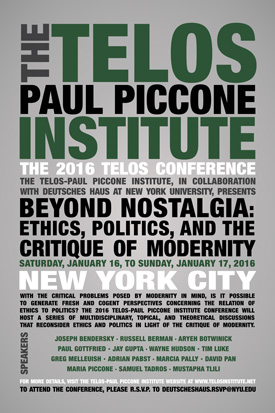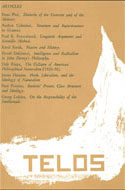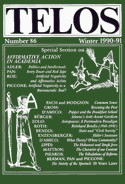By Lukas Szrot · Tuesday, February 7, 2017 During his 2004 presidential campaign, John Kerry stated, “We have to get back to the place we were, where terrorists are not the focus of our lives, but they’re a nuisance.” Though this statement was widely lampooned on right-leaning American media outlets, it is worth examining: swimming pools, and choking on one’s food, are more deadly, all things being equal, than terrorism. Yet terrorism produces a “conceptual helplessness,” in which, “We seem to be left with no good choices. To call what happened on September 11 evil appeared to join forces with those whose simple, demonic conceptions of evil often deliberately obscure more insidious forms of it. Not to call the murders evil appeared to relativize them, to engage in forms of calculation that make them understandable—and risked a first step toward making them justifiable.”
Continue reading →
By Lukas Szrot · Monday, February 22, 2016 The following paper was presented at the 2016 Telos Conference, held on January 16–17, 2016, in New York City. For additional details about this and upcoming conferences, please visit the Telos-Paul Piccone Institute website.
 What is modernity? First, a period “occasioned by a peculiarly ahistorical view of the world, which is flattened into an eternal present. The world we experience appears to exhaust all possible worlds.” Second, modernity is deeply rooted in the three Kantian principles of Enlightenment: “‘What can know?’ the question of knowledge; of the ‘What should I do?’ which is the question of ethics, and of the ‘What can I hope?'” What is modernity? First, a period “occasioned by a peculiarly ahistorical view of the world, which is flattened into an eternal present. The world we experience appears to exhaust all possible worlds.” Second, modernity is deeply rooted in the three Kantian principles of Enlightenment: “‘What can know?’ the question of knowledge; of the ‘What should I do?’ which is the question of ethics, and of the ‘What can I hope?'”
The Western modern project is dependent upon both Greek and Hebrew antiquity. In ancient Ionia, Thales of Miletus predicted a solar eclipse, Anaximander predicted the changing of the seasons, Theodorus invented the ruler, the carpenter’s square, and the level, and Hippocrates began accumulating medical knowledge through trial and error. These “pre-Socratic” Ionians were merchants and artisans; they worked with their hands, whereas the Athenians were engaged primarily in contemplation.
Continue reading →
By Lukas Szrot · Wednesday, September 9, 2015 Anthony M. Matteo’s “In Defense of Moral Realism” offers a fascinating argument. He begins with the seemingly innocuous premise that philosophy, and by extension theorizing of any stripe, should be linked to what people actually do. Philosophy of science is his analogue, the obtuse, jargon-laden pages of such work often seeming to generate little useful insight for the practitioners of science. An account of morality, by analogy, should be useful to practicing moral agents.
Continue reading →
By Lukas Szrot · Tuesday, July 7, 2015 The aftermath of the War on Terror rages on despite bipartisan assurances that “major combat operations are over” and that “the war is coming to a close.” This ongoing conflict has produced, and continues to produce, prodigious human casualties and economic hemorrhaging. Tim Luke’s words regarding September 11, 2001, are in many ways as timely today as they were nearly fourteen years ago.
Continue reading →
By Lukas Szrot · Tuesday, March 24, 2015  Given the rich and diverse history in the discipline of philosophy, many a practicing philosopher might justifiably remark that insightful philosophical inquiry must withstand the test of time. Though “The Collapse of Philosophical Naturalism” was published in Telos in 1969, many of its insights remain highly relevant to conversations that continue in philosophical and sociopolitical circles today. Dale Riepe issues a damning critique, examining four at once distinct and kindred flaws in philosophical naturalism. Given the rich and diverse history in the discipline of philosophy, many a practicing philosopher might justifiably remark that insightful philosophical inquiry must withstand the test of time. Though “The Collapse of Philosophical Naturalism” was published in Telos in 1969, many of its insights remain highly relevant to conversations that continue in philosophical and sociopolitical circles today. Dale Riepe issues a damning critique, examining four at once distinct and kindred flaws in philosophical naturalism.
Continue reading →
By Lukas Szrot · Tuesday, November 25, 2014 As Popper has written in several articles and his autobiography, he encountered Marxism as a young man in Austria around 1919. For two or three months he called himself a communist, but soon turned against the doctrine after the deaths of pro-communist demonstrators was justified with what Popper considered pseudo-scientific jargon. These events made him a fallibilist acutely aware of the distinction between dogmatic and critical thinking. (34)
 This emotionally powerful and philosophically significant experience colored Popper’s views of Marxism, the call for revolutionary social change, and the utopianism that foments it. In light of this, it is not difficult to see why Popper and (in particular early) Critical Theorists might have found much about which to disagree. Robert D’Amico discusses myriad points of contrast between Karl Popper and the Frankfurt School, though from the outset he acknowledges that the “infamous ‘methodology dispute’ in German sociology that occurred primarily between Popper and Adorno . . . is best described as a misfire” (33). Despite this alleged “misfire,” D’Amico’s analysis raises profound questions that continue to gain attention and prod ongoing debate in terms of the philosophy, theory, and methodology of the social sciences. This emotionally powerful and philosophically significant experience colored Popper’s views of Marxism, the call for revolutionary social change, and the utopianism that foments it. In light of this, it is not difficult to see why Popper and (in particular early) Critical Theorists might have found much about which to disagree. Robert D’Amico discusses myriad points of contrast between Karl Popper and the Frankfurt School, though from the outset he acknowledges that the “infamous ‘methodology dispute’ in German sociology that occurred primarily between Popper and Adorno . . . is best described as a misfire” (33). Despite this alleged “misfire,” D’Amico’s analysis raises profound questions that continue to gain attention and prod ongoing debate in terms of the philosophy, theory, and methodology of the social sciences.
Continue reading →
|
|
 What is modernity? First, a period “occasioned by a peculiarly ahistorical view of the world, which is flattened into an eternal present. The world we experience appears to exhaust all possible worlds.” Second, modernity is deeply rooted in the three Kantian principles of Enlightenment: “‘What can know?’ the question of knowledge; of the ‘What should I do?’ which is the question of ethics, and of the ‘What can I hope?'”
What is modernity? First, a period “occasioned by a peculiarly ahistorical view of the world, which is flattened into an eternal present. The world we experience appears to exhaust all possible worlds.” Second, modernity is deeply rooted in the three Kantian principles of Enlightenment: “‘What can know?’ the question of knowledge; of the ‘What should I do?’ which is the question of ethics, and of the ‘What can I hope?'”  Given the rich and diverse history in the discipline of philosophy, many a practicing philosopher might justifiably remark that insightful philosophical inquiry must withstand the test of time. Though “The Collapse of Philosophical Naturalism” was published in Telos in 1969, many of its insights remain highly relevant to conversations that continue in philosophical and sociopolitical circles today. Dale Riepe issues a damning critique, examining four at once distinct and kindred flaws in philosophical naturalism.
Given the rich and diverse history in the discipline of philosophy, many a practicing philosopher might justifiably remark that insightful philosophical inquiry must withstand the test of time. Though “The Collapse of Philosophical Naturalism” was published in Telos in 1969, many of its insights remain highly relevant to conversations that continue in philosophical and sociopolitical circles today. Dale Riepe issues a damning critique, examining four at once distinct and kindred flaws in philosophical naturalism.  This emotionally powerful and philosophically significant experience colored Popper’s views of Marxism, the call for revolutionary social change, and the utopianism that foments it. In light of this, it is not difficult to see why Popper and (in particular early) Critical Theorists might have found much about which to disagree. Robert D’Amico discusses myriad points of contrast between Karl Popper and the Frankfurt School, though from the outset he acknowledges that the “infamous ‘methodology dispute’ in German sociology that occurred primarily between Popper and Adorno . . . is best described as a misfire” (33). Despite this alleged “misfire,” D’Amico’s analysis raises profound questions that continue to gain attention and prod ongoing debate in terms of the philosophy, theory, and methodology of the social sciences.
This emotionally powerful and philosophically significant experience colored Popper’s views of Marxism, the call for revolutionary social change, and the utopianism that foments it. In light of this, it is not difficult to see why Popper and (in particular early) Critical Theorists might have found much about which to disagree. Robert D’Amico discusses myriad points of contrast between Karl Popper and the Frankfurt School, though from the outset he acknowledges that the “infamous ‘methodology dispute’ in German sociology that occurred primarily between Popper and Adorno . . . is best described as a misfire” (33). Despite this alleged “misfire,” D’Amico’s analysis raises profound questions that continue to gain attention and prod ongoing debate in terms of the philosophy, theory, and methodology of the social sciences. 

